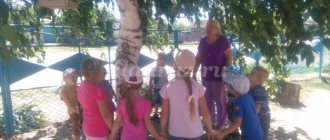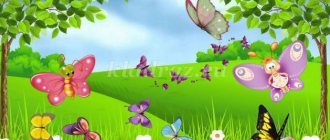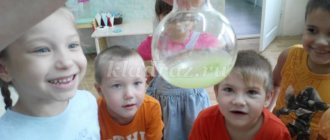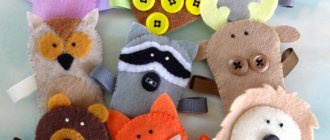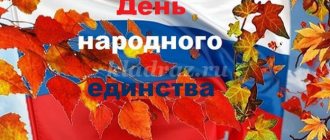Entertainment "Maslenitsa" for children of the middle group in kindergarten. Scenario
Entertainment script “Maslenitsa, come to us, bring Spring!”
for children of middle preschool age Author: Chalova Tatyana Anatolyevna, teacher of the MADOU kindergarten “Solnyshko”, town. Kamensk, Republic of Buryatia. Description: Maslenitsa has long been loved in Russia - a cheerful, mischievous holiday. At this time, they said goodbye to winter, burned an effigy of Winter and glorified Spring. This holiday symbolized people's hopes for a fruitful and fruitful year, so Maslenitsa was always very satisfying. At the center of the holiday was Maslenitsa - a figure, a doll made of straw, which was dressed up in a caftan, a hat, put on bast shoes, rode on a sleigh, and sang songs. People referred to her as a long-awaited and dear guest - “honest, broad, cheerful; noblewoman Maslenitsa, Mrs. Maslenitsa."
Purpose of the material: I bring to your attention a scenario for entertaining children of middle preschool age “Maslenitsa”. This material may be useful to educators, additional education teachers, and music directors. Goal: increasing children's cognitive interest in national holidays and traditions of their people. Objectives: to form in children an understanding of the traditions of celebrating Maslenitsa; instill in children an interest in folk games and entertainment; to cultivate in children love and respect for the traditions and customs of the Russian people. Preliminary work: conversation, guessing riddles, memorizing sayings, chants about Maslenitsa, watching the presentation “Hello Maslenitsa”, playing folk games “Rucheyok”, “Lady”, etc. Equipment : easels, whatman paper, felt-tip pens, stand with ribbons, handkerchiefs Characters : children, presenter - Matryoshka, brownie Kuzya. Progress of the entertainment: A Russian folk melody sounds, children (in Russian costumes) enter the hall in pairs, where they are met by Matryoshka and play the folk game “Stream”.
The round dance game “Stream” is an ancient ritual game that symbolized the melting of snow. The sun warmed the earth, the snow melted, and babbling brooks ran everywhere. You need to stand in pairs, hold hands and raise them up to form a stream. To the music, Matryoshka enters the stream and takes a mate. The one who is left alone is the one who drives, choosing whoever he wants. So the stream runs on and on. And along with this running, spring is approaching. (Children after the game stand in a semicircle) Matryoshka:
Hello, hello, have fun and joy! Today we are saying goodbye to winter, serving pancakes, inviting spring to us! Who can say what we call this holiday? Children: Maslenitsa!
Matryoshka: that's right guys, this is Maslenitsa - a fun, mischievous holiday. At this time, they say goodbye to winter, burn an effigy of Winter and glorify Spring. Since ancient times, Maslenitsa has been called by affectionate names: wide, cheerful, honest, Yasochka, killer whale, gourmet. Matryoshka: and back in the old days, they called for Maslenitsa and Spring with chants so that the warmth would come faster. Let's do this too, let's shout out chants
Calls: 1.child: Spring! Spring is red! Warm sunshine! Come quickly, warm the children! 2.child: Little sun, shine it, look out! The sparrows are chirping, the red spring is calling, drops are falling from the roof, the sandpipers have arrived! 3.child: Larks, quails, swallows! Come and visit us! Bring us a clear spring, a red spring! 4.child: “Maslenitsa, Maslenitsa! Maslenitsa came to visit us, Maslenitsa brought happiness! Maslenitsa, Maslenitsa, take away the winter, Maslenitsa, Maslenitsa, Spring come to us!” Matryoshka: and now I would like to clarify with you. What do they bake on Maslenitsa?
That's right, pancakes! Let's get into a round dance and sing about pancakes! (children and Matryoshka dance in a circle)
Song: “We haven’t eaten pancakes for a long time” 1. We haven’t eaten pancakes for a long time, We wanted pancakes. Chorus: Oh, pancakes, pancakes, pancakes, Gilded circles! 2. Here we are meeting Maslyana, making cheese and butter. Chorus: 3. As we started the dough, we baked a whole mountain. Chorus: 4. Spread the pancakes with more oil to make them tastier. Chorus: 5. As clear as oil in the house, Hello, Maslenitsa is red. Chorus: (children sit down) Matryoshka: well, now, my little friends, we will play together and bake pancakes! Whichever team bakes the most wins! Competition “Who can bake the most pancakes?” Children form two teams of 5 people, when given a signal, run in line to the easel and draw pancakes with a marker. Matryoshka: now let’s play chant Shout with movements “Like Maslenitsa” Children share. The girls, at a signal from Matryoshka’s right hand, shouts: “Pancakes!” boys at the left hand signal: “Have fun!” After these words, movements are performed that are specified in the chant. Like a week of oil Every day in the morning we ate... What? Pancakes! Enjoy! Around yourself with a jump! At lunch they drank tea, threw handfuls into our mouths... What? Enjoy! Pancakes! Bow for Winter! Well, at dinner, as always, the best food for us... What? Pancakes! Enjoy! Stand with your right side to the stage! We visited our mother-in-law and chewed all day... What? Enjoy! Pancakes! Bow for Spring! All insults were forgiven and oil was poured on... What? Pancakes! Enjoy! Around yourself with a jump! Matryoshka: One, two, three, four, five, I really want to dance. I invite my matryoshka girlfriends. Let's glorify Maslenitsa and dance merrily. The girls are dancing the “Matryoshka” dance. The music is playing, Kuzya the brownie flies into the hall on a broom.
Kuzya: dear little broom, stop, that’s enough, I’ve already swooped in! (gets off the broom).
-Where did this broom take me?
Oh! Oh! Oh! There are so many of you! Yes, everyone is rosy, cheerful, smart, Hello! To all of you. And chavoy, are you all gathered here? Did you recognize me? (children answer) Matryoshka: we celebrate Maslenitsa, we welcome Spring. Where are you from, Kuzya? And where did you lose your mommy Yagulechka? Kuzya: I ran away from Baba Yaga. She froze me, I can’t wait for spring. I completely exhausted her; there was no cleaning or appliances in her hut on chicken legs. The stove won’t heat, the porridge won’t cook, oh, bad, bad. But I respect order, I love to eat delicious food. And how I like to celebrate Maslenitsa. Can I stay with you in your kindergarten, I will keep order, I will help your cooks, cook porridge, bake pancakes for the children. Matryoshka: well, don’t we mind, stay and celebrate Maslenitsa with us. Kuzya: but you probably don’t know how to bake pancakes, what you need to add to the dough so that they become tasty, sweet, rosy. Matryoshka: and now we’re learning this from our guys Word game “Pancakes”
Those who know the ingredients of the pancakes quickly answer me yes or no. Fresh milk - yes! Head cabbage - no! Chicken egg - yes! Pickled cucumber - no! Jellied meat - no! Sugar and salt - yes! White beans - no! Flour, yes soda - yes! Salted fish - no! Bay leaf - no! Ghee - yes! Kuzya: Well done guys, you made me happy. Matryoshka: Kuzya, listen to what poems our guys know about pancakes. Poems: 1.child: Hello, Maslenitsa! Give us butter! We'll bake ourselves some hot pancakes - We don't care about snowstorms and frosts! If there is a frying pan, We are not afraid of the cold, Because the pancake is hot - This is the best food! 2.child: Five eggs, a glass of flour Butter, a cup, two hands. Soda, salt and milk - The mixer turns easily. He spun and spun - the pancake turned out thin. In the heat, in the heat, and with honey - We are waiting for you to visit in the evening. 3. child: We have pancakes with potatoes, and we have pancakes with cloudberries, sour cream and jam - they’re just delicious! Place the pancake in your mouth and wash it down with sweet tea. We have to eat golden brown pancakes all week! And our grandmothers will bake us pancakes! 4. child: Early one morning Kuzya took a frying pan, kneaded the dough in a bowl, and poured milk into it. And then I baked pancakes, both fragrant and delicious. Round, ruddy, honey and spicy, rich, pretty, like the sun. Kuzya: thank you guys, you even know poems about me. I like it so much! Matryoshka: Maslenitsa has come to us, And we are saying goodbye to winter, We are welcoming Spring.
Let's start a round dance and sing about spring.
Song “Hello, Spring is red” Matryoshka: we will continue to glorify Maslenitsa and have fun playing. And you, Kuzya, play with us. Musical game "Lady" with handkerchiefs. Children pass several handkerchiefs in a circle to the music. After the music stops, those with handkerchiefs in their hands go to the center of the circle and perform dance movements based on the Matryoshka display. Children standing in a circle clap. Matryoshka: on Maslenitsa people not only dance and sing, but also organize competitions and ride on carousels and sleighs.
Kuzya: Who wants to ride a horse? Competition "Horse Racing"
Matryoshka: The glorious month of March is walking across the earth. Today we are opening the solar carousel. Game "Carousel" (to Russian folk melody)
Grab your ribbons, We've had a ride - stop, It's time to rest, The game is over! Kuzya: we guys celebrated Maslenitsa well, but it’s time to recognize the honor! Matryoshka: it’s time to say goodbye and treat yourself to pancakes. And the guys in the group were waiting for pancakes. Come with us, Kuzya, to drink tea and pancakes. Goodbye, Maslenitsa, come again! In a year we will meet Beauty again. Let's celebrate again and serve pancakes! Kuzya: thank you guys for the invitation, for the fun Maslenitsa, but I just felt sorry for my grandmother Yagusya, how she was there alone, she probably lost me. I’ll fly to her, ask for forgiveness, bake pancakes, we’ll continue to live with her, and make good money! Kuzya flies out of the hall. Matryoshka and the children go into a group to drink tea and pancakes.
We recommend watching:
Scenario for the Maslenitsa holiday. Middle and senior group Project in the middle group on the theme of Maslenitsa Leisure with parents and children of the middle group on Maslenitsa. Scenario Scenario of entertainment for children of the junior - middle group in kindergarten. Maslenitsa
Similar articles:
Scenarios for Maslenitsa in kindergarten
Theatrical game in the middle group for Maslenitsa indoors
Maslenitsa. Scenario for kindergarten
Farewell to the Russian winter, or Maslenitsa. Script for children
Crafts for Maslenitsa in kindergarten step by step with photos. Preparatory group
Tell your child about Maslenitsa Week
You cannot fully celebrate Maslenitsa with children if you do not explain all the educational facts about the holiday. Remember that explanations should be simple and accessible. You can tell stories in the form of illustrative examples or in the form of riddles and legends.
Monday – Maslenitsa Meeting
The first day from which Maslenitsa begins is very important and responsible. At this time we are preparing for the holiday. You need to start by creating a scarecrow. Together with their parents, children make snow slides, ice forts, and snowmen. They carried the stuffed animal around in a sleigh and showed it to people. This means that the holiday begins. All male generations participate in fist fights. Little boys set the tone, then young boys and finally men. Every housewife's evening ends with her baking beautiful, delicious pancakes.
Tuesday – Flirting
Perhaps the most fun day. At this time, mass sledding and sleigh rides begin. The entertainment will continue until the end of the week. Children, parents, neighbors - everyone had a lot of fun together. Horse teams, sleighs, and sleds were decorated with beautiful bright scraps of fabric according to a preserved tradition. At the end of the evening, everyone visited each other and shared treats. The boys were looking for brides, and the girls went into the yard to meet their lovers.
Wednesday – Lakomka
Wednesday is the day of mother-in-law's work. Married boys and men went to their mothers-in-law. And as you know, the original Russian relationships between these family members are not easy. The wife's mother treated her son-in-law to pancakes. The point is that during the conversation at the table, their relationship improved and everyone tried to celebrate Maslenitsa as loudly and amicably as possible.
Thursday – Revelry
Thursday is called revelry due to the fact that the coming day gives rise to mass celebrations. Many feasts have dozens of guests. The main activity of Thursday is the capture of the fortress. Everyone participates in it: preschoolers, schoolchildren, students, adults. By the middle of the week, the snow kingdom became strong, as it was made in advance on Monday. For this ritual game, everyone is divided into 2 teams. Some defended the load-bearing walls of the fortress, others protected.
Friday - Mother-in-law's party
This is the return day on Wednesday. Mother-in-law and son-in-law change places. There is a tradition that in the morning the son-in-law goes to his beloved mother-in-law with a bow from the waist and invites her to his house for a feast. The mother-in-law gives the son-in-law all the utensils for making pancakes to his daughter’s house, and the father-in-law gives flour and eggs. After this, the son-in-law's house is visited not only by the wife's family, but also by other guests.
Saturday – Gatherings with sister-in-law
This day was considered a time for holding a feast with the sister-in-law (husband's sister). The young wife invited her sister-in-law to visit. If she was unmarried, then her husband’s wife could invite unmarried friends for get-togethers. And if the sister-in-law was already married, then the circle for the evening feast included only family girls.
Sunday – Farewell to Maslenitsa and Forgiveness Sunday
Last day of Maslenitsa. According to the calendar, after it comes Great Lent before Easter. On this day, everyone is waiting for the burning of the effigy, the last songs and dances, as well as entertainment. Also in Orthodoxy and not only on this day, everyone asks for forgiveness for offenses and sins. It is for this reason that the day is called Forgiveness Sunday.
Lesson Objectives
Drawing “Maslenitsa” in a preschool educational institution is aimed at solving the following problems:
- developing;
- educational.
Note! In the process of studying the traditions of the holiday and its origins, children's active and passive vocabulary is enriched; interest in the history of the Russian people and their customs awakens; Preschool children's fine arts skills are improved.
Observations on a walk and in a corner of nature in the middle group
Developmental objectives of the lesson include:
- developing children’s interest in the customs and traditions of the Russian people;
- formation of coherent speech;
- enriching the vocabulary of preschoolers;
- improving attention and memory.
To educational:
- education of patriotism;
- formation of a respectful attitude towards the traditions, customs and holidays of the Russian people.
Sayings and proverbs about Maslenitsa
For entertainment and educational purposes, we recommend telling children stories about Maslenitsa in different ways. One of them is sayings. This is the oldest way to talk about the traditional moments of the Maslenitsa celebration in poetry and jokes. Here are some current examples.
- Like during Shrovetide week, pancakes were flying at the ceiling.
- Without a pancake it’s not buttery.
- Without pancakes it’s not Maslenitsa.
- He is looking for forty years - Maslenitsa and three years of minor holidays.
- Where there are pancakes, here we are.
- There is no Maslenitsa without pancakes and no name day without pies.
- Maslenitsa does not last forever.
Cartoons about Maslenitsa
Watching cartoons is not like reading books. Children love watching videos that are dedicated to a specific topic. Therefore, if you want to tell your child about Maslenitsa, you can use a themed cartoon. From them you can learn anything: the history of the holiday, centuries-old traditions, chants, sacred rituals, narrow little-known facts, find out why they eat pancakes and make a cult out of stuffed animals. We have compiled a selection of the seven most relevant cartoons about Maslenitsa:
- Look, Maslenitsa!
- Maslenitsa is a musical film.
- Winged, furry and oily.
- Smeshariki: Maslenitsa.
- An episode about Maslenitsa from the cartoon “Prince Vladimir.”
- Peppa Pig: pancakes!
- Luntik and his friends: pancakes (episode 27).
Crafts with children for Maslenitsa
It is worth noting that the tradition passed down from generation to generation on Maslenitsa is the creation of crafts. Children love to make various “works of art” with their own hands, and parents will be happy to help them.
Mini stuffed animal
Despite the fact that generations of our ancestors placed a scarecrow on a permanent basis in the center of the settlement or on the outskirts, now it is possible to make a personal copy that everyone will place in their home.
For this craft, you will need old things, stationery, a long stick or other base for the scarecrow. Watch a video tutorial on how to quickly and easily make Maslenitsa Baba with your own hands.
Paper flowers
You can easily make paper flowers to decorate houses, courtyards, streets, and party halls. The passing winter does not welcome living plants, but the passing spring will be happy with this version of the decor. There are plenty of options for creating these crafts; choose something simple from the options below. All you need is paper, scissors and glue.
Pancake applique
What the hell is connected with Maslenitsa? Therefore, organizing a master class for children on crafts in the form of pancakes is a great idea. This will help support Maslenitsa culture and make a lot of colored circles-pancakes to decorate the place of celebration.
What do children need to know about Lent?
To introduce children as closely as possible to Maslenitsa, it is necessary to mention Lent. It doesn't have to be done in a serious way. You can use a fairy tale or another method that does not sound strict and serious.
Start introducing them small: tell about the distant history of Adam and Eve, explain about the Easter holiday, tell about all the preserved traditions. Gradually, you can take your child to church, but do not force him to pray and observe other life-affirming church traditions. At this age, he is unlikely to be able to remember everything.
Speaking about fasting, believers do not limit the consumption of food for children under 12 years of age. Their bodies are developing and require many nutrients daily.
